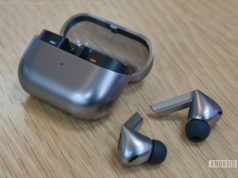Samsung Electronics Co Ltd tipped a surprise record first-quarter profit on Friday as analysts said strong chip margins and the early launch of its flagship Galaxy S9 smartphone likely masked broader weakness in the mobile market.
SEOUL: Samsung Electronics Co Ltd tipped a surprise record first-quarter profit on Friday as analysts said strong chip margins and the early launch of its flagship Galaxy S9 smartphone likely masked broader weakness in the mobile market.
The global semiconductor leader and Apple Inc smartphone rival forecast its January-March profit to leap 57.6% from a year earlier to 15.6 trillion won ($14.7 billion), beating an average forecast of 14.5 trillion won from a Thomson Reuters survey of 21 analysts.
Revenue for the quarter was tipped to rise 18.7% to 60 trillion won, Samsung said in a regulatory filing.
The South Korean company did not elaborate on its performance and will disclose detailed earnings in late April.
„Even if profits start falling in the second half, Samsung will have a strong balance sheet this year,“ said Song Myung-sup, analyst at HI Investment & Securities.
Analysts expected the chip division to continue to drive profits, after contributing an estimated 10.7 trillion won to first-quarter earnings.
Lower costs and strong demand for DRAM chips used in servers have fattened the division’s margins, putting Samsung on track for record annual earnings amid expectations of tight supply for the remainder of the year.
The mobile business also appeared to have made a surprisingly solid contribution to first-quarter earnings, analysts said, despite a broader slowdown in global smartphone sales.
They put this down to Samsung’s early launch of its premium Galaxy S9 device as well as healthy sales of older models as consumers balk at the high price-tags on the latest premium models.
„DRAM prices were good, so the chips division could have earned more than the market expected. But there was probably some upside in the mobile business,“ said Greg Roh, analyst at HMC Investment & Securities.
The S9, which began selling in most markets in mid-March, launched a full five weeks before its predecessor S8 in 2017.
Worldwide smartphone shipment volumes shrank for the first time in 2017, according to data from industry tracker IDC, as steep prices for high-end models and slowing innovation prompted consumers to delay purchasing upgrades.
Concerns about the smartphone market and a subsequent fall in demand for components like OLED screens – used in Apple’s iPhone X – are behind a roughly 4.4% fall in Samsung Electronics‘ share price so far this year, from a record high in November.
Samsung shares fell 2.3% on Friday after the earnings guidance, compared to a 0.7% drop in the wider market.
DRAM prices and the performance of the flagship Galaxy S9 smartphone launched in March will be other key variables for Samsung going forward.
„The Galaxy S9 series will face headwinds that are affecting all premium smartphone makers,“ research firm Strategy Analytics told Reuters last week.






